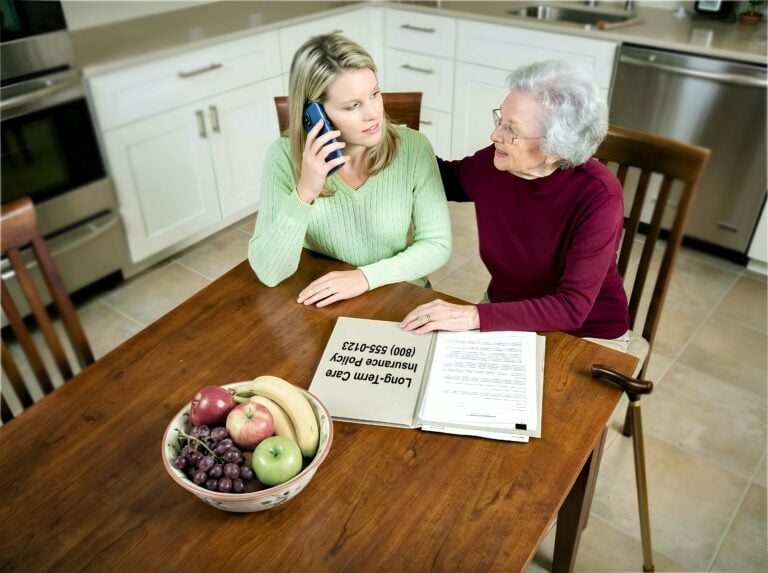At All Heart Home Care, we’ve walked alongside many families facing the emotional, confusing journey of Alzheimer’s. If you’re here, it likely means someone you love is changing in ways that feel unfamiliar, and maybe a little frightening. We want you to know—you’re not alone.
Understanding what to expect as Alzheimer’s progresses can help you prepare emotionally and practically. According to the Alzheimer’s Association’s 2025 Facts and Figures, more than 7.2 million Americans age 65 and older are now living with Alzheimer’s disease—a number projected to nearly double to 13.8 million by 2060. Whether you’re just beginning to notice signs or deep in day-to-day caregiving, this guide is for you.
Understanding the Stages: How Alzheimer’s Unfolds
In June 2024, the Alzheimer’s Association published revised criteria for diagnosing and staging Alzheimer’s disease. These updated guidelines recognize that Alzheimer’s is a biological process that begins with changes in the brain years—sometimes decades—before symptoms appear. While researchers now use sophisticated biomarker testing to track the disease’s progression, families typically experience Alzheimer’s through three recognizable stages: early (mild), middle (moderate), and late (severe).
On average, a person with Alzheimer’s lives four to eight years after diagnosis, though some live as long as 20 years depending on their overall health and other factors. Every journey is different—and understanding what may lie ahead can help you prepare.
The Mild / Early Stage: When the Little Things Start to Feel Off
It often starts subtly. Your loved one might forget a recent conversation, lose track of appointments, or ask the same question a few times in a row. Maybe they get a little quieter in social settings, unsure of themselves. At this stage, many families question if it’s just aging—or something more.
This phase is often marked by denial or frustration. You may feel unsure how to help, or your loved one may push back on your concern. But this is also a window where routine, patience, and reassurance can really help.
During this stage, individuals often begin to show more noticeable cognitive and behavioral changes:
• Short-term memory issues — New information is harder to retain, and your loved one may frequently ask the same question, unaware that it’s been answered before.
• Struggles with reasoning and decision-making — Tasks that once felt manageable, like organizing a family gathering or handling finances, can now feel overwhelming. You may notice lapses in judgment, particularly in financial or safety-related decisions.
• Challenges with communication — Finding the right words becomes difficult. Your loved one may pause frequently when speaking or have difficulty explaining ideas clearly.
• Shifts in personality and mood — Someone who was once outgoing might withdraw in social settings. Others may become unusually irritable or frustrated. Motivation to complete tasks may also fade, even for tasks they once enjoyed.
• Disorientation and misplaced items — Even in familiar places, your loved one might get confused or lost. Personal belongings may frequently go missing, sometimes ending up in unusual spots.
Emotional Truth: This stage feels like watching someone drift just out of reach, even while they’re still right in front of you. The hardest part isn’t the memory loss—it’s knowing they sense the changes too, and you’re both trying to hold on as things start to shift.
Care Tips for the Early Stage:
✓ Support memory with visual aids — Keep calendars visible, make lists, and use gentle reminders rather than corrections.
✓ Focus on tone over words — Your calm, reassuring presence can soothe more than anything you say.
✓ Encourage independence — Offer subtle support while allowing your loved one to do what they can.
✓ Start important conversations now — Begin legal and financial planning while your loved one can still participate in decisions.
✓ Explore early treatment options — Ask about FDA-approved medications that may slow progression in early stages.
The Moderate Stage: When Care Starts to Shift
The middle stage is typically the longest, often lasting for many years. As Alzheimer’s progresses into this phase, you may notice your loved one struggling with daily tasks. They might need help choosing clothes, preparing meals, or remembering how to get home from familiar places. Sometimes confusion turns to frustration or anger—not because they’re difficult, but because the world no longer makes sense to them.
For many San Diego families, this is when home care becomes more than just a conversation. It becomes a lifeline.
During this stage, you may notice:
• More frequent confusion and lapses in judgment — It’s common for someone in this phase to lose track of time, forgetting what day it is or even the current season. They might mix up names or faces, mistaking one family member for another. Some may begin to wander, often seeking places that feel safe or familiar.
• Deeper memory loss — Important personal information, like home addresses, phone numbers, or the names of schools they attended, may be forgotten. You may notice them repeating favorite stories or inventing details to fill gaps in memory.
• Shifts in personality and behavior — Individuals may become suspicious or paranoid without cause, sometimes believing that loved ones are stealing from them. Hallucinations—seeing or hearing things that aren’t real—can also occur. Emotional changes are common, including increased irritability, restlessness, or anxiety.
• Increased need for support with personal care — At this point, your loved one may need assistance picking out appropriate clothing, managing hygiene, or using the restroom. What were once simple tasks may now feel overwhelming to them.
• Sleep disturbances and sundowning — Many individuals in this stage experience changes in their sleep-wake cycle. They may nap frequently during the day and struggle to sleep at night, often becoming more restless or agitated as the sun sets.
Understanding Sundowning
Sundowning refers to increased confusion, agitation, and restlessness that occurs in the late afternoon through evening hours. While the exact cause isn’t fully understood, it may be related to fatigue, low lighting, disrupted internal body clocks, or changes in the brain itself. Research shows that approximately one in five people with dementia experience sundowning.
Strategies for Managing Sundowning:
✓ Maintain consistent routines — Keep regular times for waking, meals, activities, and bedtime.
✓ Schedule wisely — Plan demanding activities and appointments for morning hours when alertness is highest.
✓ Maximize natural light — Encourage time near windows or outdoors during the day.
✓ Keep evenings well-lit — Reduce shadows and confusion by increasing indoor lighting as darkness falls.
✓ Reduce evening stimulation — Avoid loud TV, busy activities, or stressful conversations in the late afternoon.
✓ Adjust meal timing — Offer a larger meal at lunch and keep dinner lighter.
✓ Limit caffeine and alcohol — Especially in the afternoon and evening hours.
✓ Try calming activities — Soft music, looking at photographs, or gentle walks can help ease restlessness.
If sundowning becomes severe, speak with your loved one’s healthcare provider. In 2023, the FDA approved brexpiprazole (Rexulti) specifically for agitation associated with Alzheimer’s dementia—the first medication of its kind. However, non-pharmacological approaches remain the preferred first-line treatment.
Emotional Truth: You may start grieving the person you once knew, even as you continue to care for them every day. That grief is real. And it’s okay to feel it.
Care Tips for the Middle Stage:
✓ Redirect rather than correct — Avoid arguing. If they believe they need to “go to work,” try saying, “You’ve earned the day off today.”
✓ Meet them in their reality — Joining their world causes less distress than forcing them into yours.
✓ Take breaks — Consider respite care or adult day programs to give yourself time to recharge.
✓ Implement safety measures — Door alarms, medication lockboxes, and secure identification help prevent accidents.
The Severe / Late Stage: When Presence Becomes Everything
In the final stage of Alzheimer’s disease, communication declines. Words slip away. Your loved one may no longer recognize faces or even speak.
But that doesn’t mean they can’t feel you.
They can feel your voice, your touch, your love.
Physical care becomes more demanding in this stage—feeding, bathing, and repositioning. It can be overwhelming. That’s when having experienced, gentle caregivers by your side can make a world of difference. At All Heart Home Care, we specialize in bringing calm and compassion to even the most difficult moments.
At this stage, most individuals require full-time care and supervision. Common experiences include:
• Loss of meaningful speech — The ability to communicate clearly is greatly reduced. While they may still speak a few words or short phrases, forming coherent sentences or engaging in conversation typically becomes impossible.
• Severe physical decline — Movement becomes very limited. Many people can no longer walk independently and may need assistance to sit up or keep their heads upright. Muscle stiffness and altered reflexes are common. Swallowing becomes harder, and control over bladder and bowel function often diminishes.
• Complete dependence for personal care — Daily tasks like eating, dressing, toileting, and hygiene all require hands-on assistance.
• Vulnerability to infections — Pneumonia is common in late-stage Alzheimer’s and is the most frequent cause of death for people with the disease.
Emotional Truth: Even when words are gone, your presence still reaches them. Love isn’t measured by memory—it’s felt in the silence, in your touch, and in the quiet moments you continue to show up.
Care Tips for the Late Stage:
✓ Connect through the senses — Holding a hand or playing familiar music can be more powerful than anything you could say.
✓ Prioritize comfort — Focus on quality of life rather than aggressive treatment.
✓ Use calm, gentle communication — Speak softly and use touch. Senses often remain even when cognition has faded.
✓ Consider hospice care — Hospice focuses on comfort and dignity while supporting the entire family.
New Medicare Support: The CMS GUIDE Model
In July 2024, the Centers for Medicare & Medicaid Services launched an innovative program specifically designed to support families navigating Alzheimer’s and dementia. The GUIDE (Guiding an Improved Dementia Experience) Model is an eight-year nationwide pilot program now operating through 330 participating healthcare organizations across 46 states.
For eligible Medicare beneficiaries with dementia, the GUIDE Model provides:
• Dedicated Care Navigators — Each family is paired with a trained professional who coordinates care, connects you to resources, and provides ongoing support.
• Respite care benefits — Up to $2,500 per year per patient to pay for temporary relief, including in-home caregivers, adult day programs, or overnight respite care.
• 24/7 access to support — Round-the-clock helplines for urgent questions and concerns.
• Caregiver training and education — Programs to help you develop skills for managing challenging behaviors and providing safe care.
• Connections to community resources — Help accessing meals, transportation, support groups, and other local services.
The goal is to help people with dementia remain safely at home longer while reducing unnecessary hospitalizations and supporting caregiver health and well-being. Ask your loved one’s healthcare provider if they participate in the GUIDE Model, or visit the Alzheimer’s Association GUIDE resource page for more information.
Planning Ahead: Legal and Financial Considerations
One of the most important things you can do after an Alzheimer’s diagnosis is plan for the future while your loved one can still participate in decisions. Early planning eliminates guesswork, reduces family conflict, and ensures your loved one’s wishes are honored.
Key Documents to Prepare:
• Durable Power of Attorney for Healthcare — Names someone to make medical decisions when your loved one can no longer do so, including end-of-life care choices.
• Durable Power of Attorney for Finances — Names someone to manage financial matters, pay bills, and handle assets.
• Living Will (Advance Directive) — Documents wishes for medical treatment, including life-prolonging measures.
• Standard Will — Specifies how property and assets will be distributed after death.
• Dementia-Specific Directive — A newer type of document that addresses unique situations that arise with Alzheimer’s, such as preferences about living arrangements, driving, and care as the disease progresses.
Many states provide free advance directive forms you can complete without an attorney. The Alzheimer’s Association Legal Planning resources and the National Hospice and Palliative Care Organization’s CaringInfo program offer state-specific forms. For complex situations, consider consulting an elder law attorney who specializes in dementia-related legal matters.
▶ Important — The diagnosis of Alzheimer’s alone does not mean someone is legally incapacitated. Many people with mild or moderate dementia retain the ability to make competent decisions about certain aspects of their lives. This is why having these conversations and completing legal documents early is so crucial—it protects your loved one’s autonomy and ensures their voice guides their care.
When to Consider Hospice Care
Hospice care focuses on comfort, dignity, and quality of life at the end of life. It can greatly benefit people in the final stages of Alzheimer’s and their families. Hospice doesn’t mean giving up—it means shifting the focus from treatment to comfort, ensuring your loved one remains as peaceful as possible while supporting the entire family.
Signs It May Be Time to Discuss Hospice:
• Loss of ability to speak meaningfully — Cannot communicate needs or hold conversations.
• Severe mobility limitations — Unable to walk without assistance or sit up independently.
• Complete dependence — Requires full assistance for all personal care.
• Difficulty swallowing — Struggles with eating or refuses food.
• Recurrent infections — Repeated pneumonia or urinary tract infections.
• Significant weight loss — Declining despite adequate nutrition efforts.
To be eligible for hospice care, an individual must have a life expectancy of six months or less as certified by a physician. Hospice services are covered by Medicare, Medicaid, and most private insurance. Services can be provided wherever your loved one lives—at home, in an assisted living facility, or in a nursing home.
A hospice team typically includes doctors, nurses, home health aides, social workers, counselors, chaplains, and trained volunteers. They address physical, emotional, and spiritual needs for both the patient and family, and provide grief support after death.
Support for Caregivers: You Matter Too
According to the Alzheimer’s Association, nearly 12 million Americans provide unpaid care for people with Alzheimer’s and other dementias, contributing more than 19 billion hours of care annually—valued at $413.5 billion. More than half of caregivers report high or very high emotional stress, and many experience depression, anxiety, and declining physical health.
Caring for yourself isn’t selfish—it’s essential. As one caregiver put it, “The care you give to yourself is the care you give to your loved one.”
Resources Available to You:
• Alzheimer’s Association 24/7 Helpline — Call 800-272-3900 any time, day or night, to speak with master’s-level clinicians in over 200 languages.
• Alzheimer’s Foundation of America Helpline — Call 866-232-8484 (7 days a week, 9am-9pm ET) for licensed social workers.
• Support Groups — The Alzheimer’s Association offers both in-person and virtual support groups where you can connect with others who truly understand.
• Respite Care — Adult day programs and in-home respite services give you time to rest, recharge, or handle personal matters.
• Caregiver Training — Evidence-based programs teach skills for managing challenging behaviors, improving communication, and keeping your loved one safe.
• Eldercare Locator — Call 800-677-1116 or visit eldercare.acl.gov to find local services.
Self-Care Reminders:
✓ Accept help — When it’s offered—and ask for it when you need it.
✓ Take regular breaks — Even if just for a few minutes.
✓ Stay connected — With friends, family, and support groups.
✓ Don’t neglect your health — Keep your own medical appointments.
✓ Allow yourself to feel — Grief, frustration, and guilt are normal and don’t make you a bad caregiver.
References
- Alzheimer’s Association: 2025 Alzheimer’s Disease Facts and Figures
- Alzheimer’s Association: Revised Criteria for Diagnosis and Staging of Alzheimer’s Disease (2024)
- CMS: GUIDE (Guiding an Improved Dementia Experience) Model
- Alzheimer’s Association: Sundowning and Sleep Issues
- Alzheimer’s Association: Legal Documents
- Alzheimer’s Association: Hospice Care
You Don’t Have to Walk This Road Alone
Alzheimer’s is a long journey, and every path is different. But here’s one thing we believe with all our hearts: love still comes through, even when memory fades.
At All Heart Home Care, we serve families across San Diego County with in-home Alzheimer’s care that’s both compassionate and professional. As a veteran-owned, nurse-led agency serving San Diego since 2014, we understand the unique challenges families face—and we’re here to help. Whether you need a few hours of support, overnight care, or full-time assistance, we’ll meet you where you are with empathy, skill, and open hearts.
If you’re caring for someone with Alzheimer’s and feeling overwhelmed, let’s talk. We’ll help you create a plan that honors your loved one and supports you, too.
Call us at (619) 736-4677 to learn how we can help.
You don’t have to do this alone. We’re here to help with all your home care needs.





